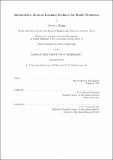Interpretable machine learning methods for stroke prediction
Author(s)
Zhang, Rebecca
Download1138021852-MIT.pdf (1.098Mb)
Other Contributors
Massachusetts Institute of Technology. Operations Research Center.
Advisor
Dimitris Bertsimas.
Terms of use
Metadata
Show full item recordAbstract
Machine learning has long been touted as the next big tool, revolutionizing scientific endeavors as well as impacting industries like retail and finance. Naturally, there is much interest in the potential of next improving healthcare. However, using traditional machine learning approaches in this domain has many difficulties, chief among which is the issue of interpretability. We focus on the medical condition of stroke, a particularly desirable problem to target because it is one of the most prevalent and yet preventable conditions affecting Americans today. In this thesis, we apply novel interpretable prediction techniques to the problem of predicting stroke presence, location, acuity, and mortality risk for patient populations at two different hospital systems. We show that using an interpretable, optimal tree-based approach is roughly as effective if not better than black-box approaches. Using the clinical learnings from these studies, we explore new interpretable methodologies designed with medical applications and their unique challenges in mind. We present a novel regression algorithm to predict outcomes when the population is comprised of notably different subpopulations, and demonstrate that this gives comparable performance with improved interpretability. Finally, we explore new natural language processing techniques for machine learning from text. We propose an alternate end-to- end framework for going from unprocessed textual data to predictions, with an interpretable linguistics-based approach to model words. Altogether, this work demonstrates the promise that new parsimonious, interpretable algorithms have in the domain of stroke and broader healthcare problems.
Description
This electronic version was submitted by the student author. The certified thesis is available in the Institute Archives and Special Collections. Thesis: S.M., Massachusetts Institute of Technology, Sloan School of Management, Operations Research Center, 2019 Cataloged from student-submitted PDF version of thesis. Includes bibliographical references (pages 70-75).
Date issued
2019Department
Massachusetts Institute of Technology. Operations Research Center; Sloan School of ManagementPublisher
Massachusetts Institute of Technology
Keywords
Operations Research Center.